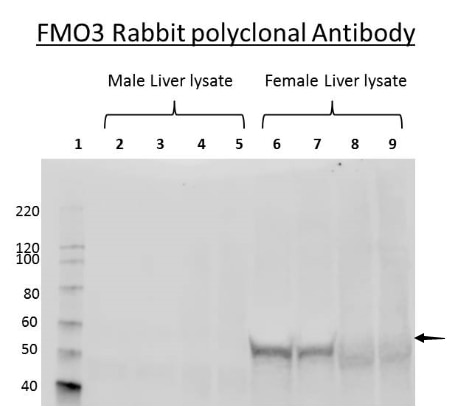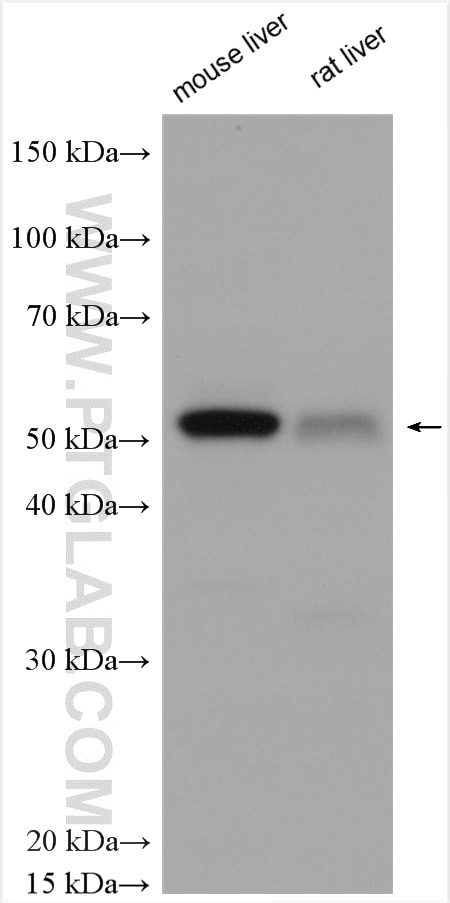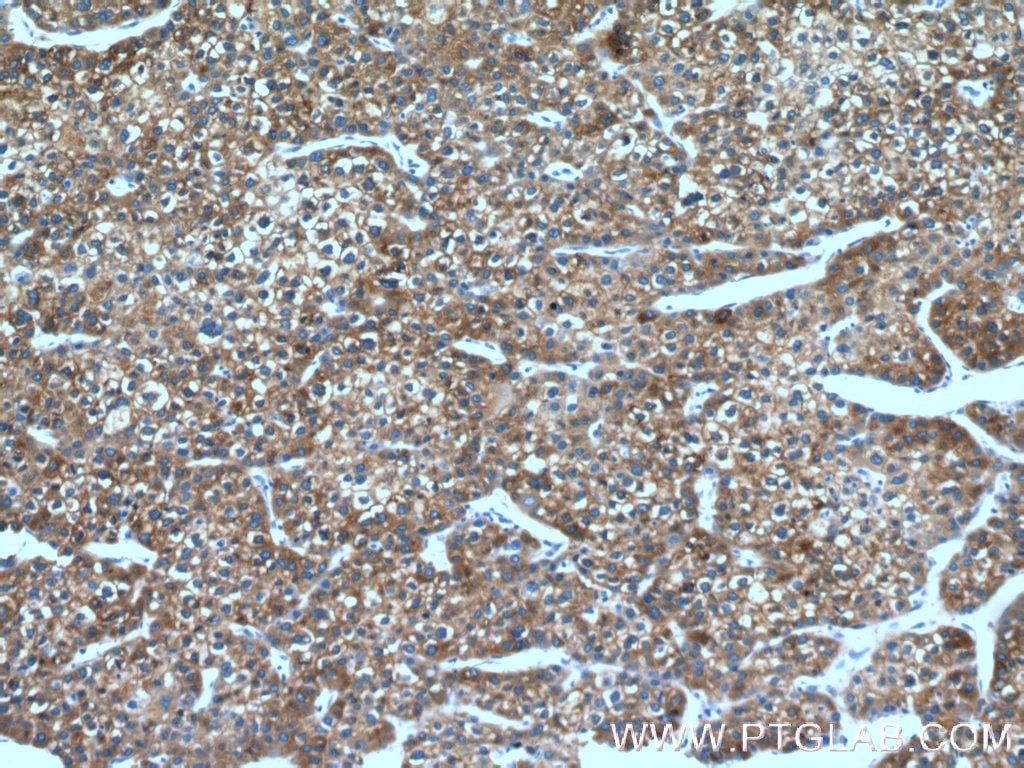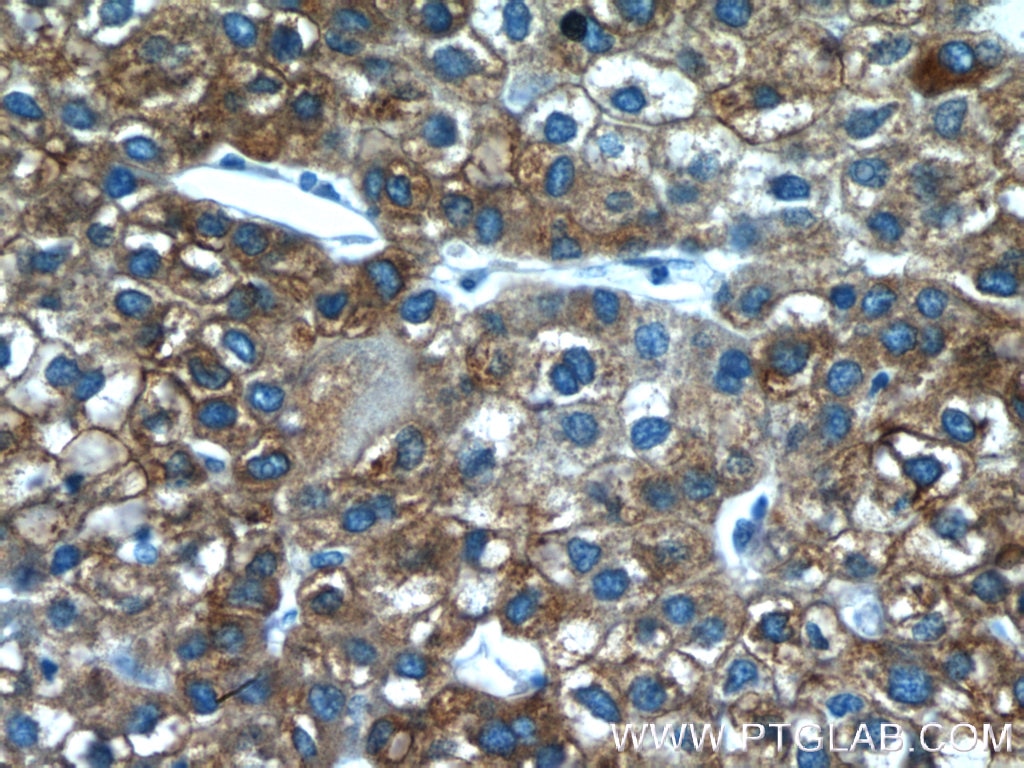- Phare
- Validé par KD/KO
Anticorps Polyclonal de lapin anti-FMO3
FMO3 Polyclonal Antibody for WB, IHC, ELISA
Hôte / Isotype
Lapin / IgG
Réactivité testée
Humain, rat, souris
Applications
WB, IHC, ELISA
Conjugaison
Non conjugué
N° de cat : 17469-1-AP
Synonymes
Galerie de données de validation
Applications testées
| Résultats positifs en WB | tissu hépatique de souris, tissu hépatique de rat |
| Résultats positifs en IHC | tissu de cancer du foie humain, il est suggéré de démasquer l'antigène avec un tampon de TE buffer pH 9.0; (*) À défaut, 'le démasquage de l'antigène peut être 'effectué avec un tampon citrate pH 6,0. |
Dilution recommandée
| Application | Dilution |
|---|---|
| Western Blot (WB) | WB : 1:100-1:500 |
| Immunohistochimie (IHC) | IHC : 1:50-1:500 |
| It is recommended that this reagent should be titrated in each testing system to obtain optimal results. | |
| Sample-dependent, check data in validation data gallery | |
Applications publiées
| WB | See 7 publications below |
| IHC | See 2 publications below |
Informations sur le produit
17469-1-AP cible FMO3 dans les applications de WB, IHC, ELISA et montre une réactivité avec des échantillons Humain, rat, souris
| Réactivité | Humain, rat, souris |
| Réactivité citée | rat, souris |
| Hôte / Isotype | Lapin / IgG |
| Clonalité | Polyclonal |
| Type | Anticorps |
| Immunogène | FMO3 Protéine recombinante Ag11405 |
| Nom complet | flavin containing monooxygenase 3 |
| Masse moléculaire calculée | 532 aa, 60 kDa |
| Poids moléculaire observé | 60 kDa |
| Numéro d’acquisition GenBank | BC032016 |
| Symbole du gène | FMO3 |
| Identification du gène (NCBI) | 2328 |
| Conjugaison | Non conjugué |
| Forme | Liquide |
| Méthode de purification | Purification par affinité contre l'antigène |
| Tampon de stockage | PBS with 0.02% sodium azide and 50% glycerol |
| Conditions de stockage | Stocker à -20°C. Stable pendant un an après l'expédition. L'aliquotage n'est pas nécessaire pour le stockage à -20oC Les 20ul contiennent 0,1% de BSA. |
Informations générales
Microsomal flavin-containing monooxygenase (FMO) catalyzes the FAD-, NADPH-, and O2-dependent oxidation of a large number of xenobiotics containing soft nucleophiles,including alkaloids, pesticides, and pharmaceutical substances.Based on the cDNA sequence, the FMOs are classified into five subfamilies (FMO1 to FMO5) (PMID:11792679).In human beings, FMO3 is predominant in the adult liver, but not appear sex-dependent in the adult human liver. In the mouse liver, its expression has been shown to be sex-dependent and expressed only in females (PMID:11996886). Defects in FMO3 are the cause of trimethylaminuria (TMAU). This antibody is specific to FMO3.
Protocole
| Product Specific Protocols | |
|---|---|
| WB protocol for FMO3 antibody 17469-1-AP | Download protocol |
| IHC protocol for FMO3 antibody 17469-1-AP | Download protocol |
| Standard Protocols | |
|---|---|
| Click here to view our Standard Protocols |
Publications
| Species | Application | Title |
|---|---|---|
J Hazard Mater Dietary titanium dioxide particles (E171) promote diet-induced atherosclerosis through reprogramming gut microbiota-mediated choline metabolism in APOE-/- mice. | ||
EBioMedicine Akkermansia muciniphila prevents cold-related atrial fibrillation in rats by modulation of TMAO induced cardiac pyroptosis. | ||
Front Microbiol Berberine Improves Vascular Dysfunction by Inhibiting Trimethylamine-N-oxide via Regulating the Gut Microbiota in Angiotensin II-Induced Hypertensive Mice. | ||
Food Sci Biotechnol Effects of black raspberry extract on gut microbiota, microbial metabolites, and expressions of the genes involved in cholesterol and bile acid metabolisms in rats fed excessive choline with a high-fat diet | ||
Int J Biochem Cell Biol Deciphering the diurnal rhythm regulating mechanism of flavin-containing monooxygenase 3 in mouse liver | ||
Antimicrob Agents Chemother Metabolic mechanism and pharmacological study of albendazole in secondary hepatic alveolar echinococcosis (HAE) model rats |





